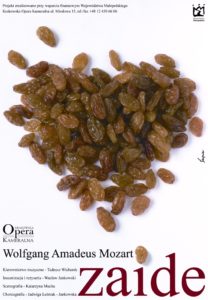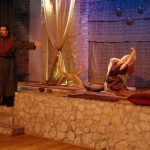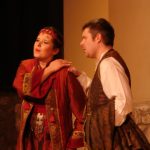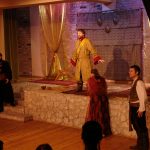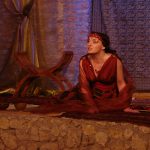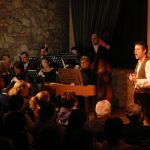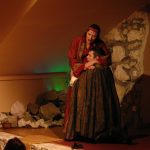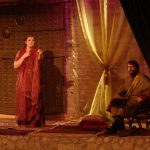Credits
Staging and directing: Wacław Jankowski
Musical direction: Tadeusz Wicherek
Choreography, stage movement composition: Jadwiga Leśniak-Jankowska
Set design, costumes: Katarzyna Mucha
Conductor: Paweł Szczepański
Zaide: Anna Stolarczyk (soprano)
Gomatz: Maciej Gallas (tenor)
Allazim: Robert Szpręgiel (baritone)
Soliman: Paweł Fundament (tenor)
Osmin: Michał Kutnik (baritone)
Narrator: Martyna Malcharek
Seriban: Katarzyna Domanus
The Krakow Chamber Opera Orchestra
Violin I: Anna Wójtowicz
Violin I: Elżbieta Zarębska
Violin II: Małgorzata Sopel
Viola: Bogusława Jagielnicka-Hawryszkow
Viola: Magdalena Podsiadło
Cello: Kinga Staniszewska
Double bass: Jarosław Wilkosz
French horn: Paweł Popowicz
Flute: Ewa Tupik
Oboe I: Jerzy Hawryszków
Oboe II: Ewa Kieres
Bassoon: Maciej Rygielski
Spinet: Anna Huszczo
Photos
fot. Renata Kwiatek, Paweł Zechenter
Reviews
THE MOST IMPORTANT MUSICAL EVENT OF THE PASSING YEAR
WHAT IS MOST MEMORABLE
Theatre EL-JOT SCENE – KRAKOW CHAMBER OPERA
A theatre and musical stage, a place where young singers build up their careers.
Thanks to this institution Krakow opera aficionados could see Mozart’s ‘Zaide’ for the first time.
Anna Woźniakowska
Dziennik Polski
27th December 2006
* * * * * * * *
THE LOST ZAIDE
Mozart’s singspiel has debuted on Krakow theatrical scene.
In 1799, Constanze Mozart stumbled across a manuscript of stage play while organizing her late husband’s paperwork. This lost work was a singspiel known today under the title ‘Zaide’. The Krakow premiere of ‘Zaide’ took place last weekend on the stage of Krakow Chamber Opera.
The piece found by Constanze was incomplete. It consisted of two acts, was not preceded by overture and there has been no trace of libretto in the documents.’Zaide’ was most likely created as a voice in the discussion which was ongoing in Germany at the time of its writing. The omnipresent Italian opera was coming in for more and more criticism and the demand for a purely German stage was rising. Singspiel as a genre did not really interest composers or theatres of the time. The German singspiel is even more peculiar as it uses spoken word instead of recitatives (Polish in the version performed by artists of Krakow Chamber Opera). The thematic range is most often sentimental, and ‘Zaide’ is no different in this respect. The melody of vocal parts was never too complex, there were also no elements aimed at impressing the audience.
The libretto has been based upon a novel ‘Das Serail’ by Franz Josef Sebastiani. It resembles another work by Mozart – ‘The Abduction from the Seraglio’. Unfortunately, the original version of ‘Zaide’ does not have an ending, therefore we still do not know how the composer would conclude his work.
Ever since this singspiel has been staged for the first time 140 years ago many different endings are being used, and the reconstructed text is presented as a dialogue or narration. Krakow Chamber Opera opted for the latter, and the ending has been derived directly from the Sebastiani’s novel. The final product is a brief, intimate spectacle with a bunch of characters which takes less than two hours. The sung parts are as far from the elaborate arias as they possibly could, with the only slight exception being the song of Zaide (played by brilliant Kamila Kułakowska).
Monika Frenkiel
Gazeta Krakowska
December 12th, 2006
* * * * * * * *
Theatre ‘Scena El-Jot’ in Krakow has already been active for 15 years. It is the basis of the Krakow Chamber Opera, led from its inception in 2004 by the artistic couple, Jadwiga Leśniak-Jankowska and Wiesław Jankowski. They are the co-producers of yet another premiere, which coincides with Chamber Opera’s jubilee – ‘Zaide’, a singspiel by W.A. Mozart. (…) The staging of ‘Zaide’ has been arranged musically by conductor of Warsaw Chamber Opera, Tadeusz Wicherek.
And he did it in style. A 13-person ensemble (string quintet, French horn, flute, oboe, bassoon and harpsichord) operated with beautifully tuned sound and, overall, sounded exquisitely. The soloists did a fine job as well – their voices are rather intimate, but pleasant. The voice behind the eponymous character, Kamila Kułakowska, surely deserves a special praise. Her part is fair-sized and not easy to handle. The artist sings with a high degree of sophistication and vocal prowess. Starring in the remaining roles were: Maciej Gallas (Gomatz), Przemysław Żywczok (Allazim), Paweł Fundament (Soliman), Nichał Kutnik (Osmin) and Agnieszka Findysz (Seriban). The spoken dialogues were given to the narrator, Magdalena Kajrowicz (she declaimed them in Polish, while the sung parts were delivered in German).
The whole staging (directing, scenography, costumes, stage movement, lighting) has been perfectly fitted into the charming design of the Krakow Chamber Opera main hall and was really impressive. Let us hope for more such shows in the coming years!
Jacek Chodorowski
TRUBADUR
Year 1, Issue 4 (41)
October-December 2006
* * * * * * * *
BRILLIANT JUBILEES
The El-Jot scene is already 15 years old. Jadwiga Leśniak-Jankowska and Wacław Jankowski have been consequently creating a unique cultural institution during that time – one in which music functions on the same terms as spoken word, and a studied gesture often means more than the pace of the play.
These days the theatre at Miodowa St. offers you a chance to immerse yourself in another world. Spectacles combining poetry and music, concerts in a simple yet aesthetic visual setting – all of them feel like they take place somewhere beyond time and develop in their own, peculiar rhythm. They always find eager viewers, and that is why the Krakow Chamber Opera has been established.
The 15th anniversary of the institution has been celebrated on Saturday with the premiere of ‘Zaide’ – a singspiel by Mozart which has not been staged in Krakow before. It is a model for the latter ‘The Abduction from the Seraglio’. The work was left unfinished by the composer, but at the same time was complete enough for its score to be published in the mid-19th c. It has been staged worldwide ever since.
The staging of this singspiel required tackling of one particular problem, mainly the spoken text. Should it be given to the singers or should a narrator be used instead? In which language should the play be presented? Wacław Jankowski has opted for a female narrator, Magdalena Kajrowicz, to tell the missing parts of the story. She presented the Polish text in an interesting way, albeit with too much ceremony in the first act. The vocal parts were sung in the original German. The music on Saturday could satisfy the most discerning listeners, mostly due to the excellent preparation and the way Tadeusz Wicherek, conductor of Warsaw Chamber Opera, orchestrated the spectacle. After all, he is an expert on Mozart. The musical ensemble sounded excellent this evening, and the soloists also did a great job. Special praise should go to Kamila Kułakowska, a soprano from Bydgoszcz, who performed the eponymous role. She braved the arduous difficulties of Mozart’s music competently and with great musicality. The leading soprano has been accompanied by a group of talented Krakow singers: tenors Maciej Gallas and Paweł Fundament, baritones Przemysław Żywczok and Michał Kutnik and perfectly trained Agnieszka Findysz.
All in all, it has been a fitting spectacle for a jubilee. We wish them many more years of fruitful work!
Anna Woźniakowska
DZIENNIK POLSKI
December 12th, 2006
* * * * * * * *
BURGUNDY, GOLD AND SWEET TEARS
‘Zaide’, directed by Wacław Jankowski, staged in Krakow Chamber Opera. Reviewed by Monika Partyk for ‘Ruch Muzyczny’.
The El-Jot Scene is a private theatre which celebrates its 15th anniversary this year. Two years ago the Krakow Chamber Opera, a joint project of Mr. and Mrs. Jankowski, has started its life in the same place. It is the only private opera in Poland with such repertoire. Founders of the theatre have set its artistic profile right at the very beginning: the El-Jot Scene is a musical theatre which draws from the past, often by bringing back to life the old, lesser known plays. The elegant stage movement, studied gesture and stylish, always refined visual setting are as important as the music itself. The spectacles are pleasant to watch and listen to, and the family atmosphere allows us to forget that we are, after all, visiting a serious cultural institution. The El-Jot Scene has found its permanent residence only seven years ago, in the heart of the former Jewish district of Kazimierz. Despite that fact, today it would be almost impossible to imagine Miodowa St. without the characteristic theatre gate. To celebrate the theatre’s 15th anniversary and the Mozart Year the Krakow Chamber Opera has prepared the staging of ‘Zaide’ – a singspiel which has not been performed in Krakow before.
(…)
The basic issue with staging of ‘Zaide’ is always the choice of finale – director Jankowski opted for a fortunate ending. The spoken lines were not included in the singers’ dialogues – instead, it has been recited by a female narrator. The sung parts, on the other hand, remained in the original, German version. According to the tradition, the opera has been introduced with one of Mozart’s distinctly Eastern-sounding pieces. It allowed the listeners to set themselves in the Oriental world of the play. The high quality of the chamber ensemble was largely driven by the experience of its conductor, Tomasz Wicherek. He has conducted spectacles of Warsaw Chamber Opera for the last sixteen years and took part in all of its Mozart Festivals, which is why he had an opportunity to conduct all of Mozart’s stage works. The eponymous character has been played by Kamila Kułakowska, who also is no stranger to performing Mozart on stage. A young singer from Bydgoszcz, winner of numerous competitions, was by all means a leading singer. Her powerful, resonant soprano overcame all the intricacies of the score with a truly Mozartian ease. The technical skills of tenor Maciej Gallas, who played Gomatzo (he debuted many years ago as Tamino in ‘The Magic Flute’), were well matched with Kołakowska, although you could hear that his kind of voice is meant for the chamber opera. The other young performers also, I presume, did not disappoint the listener. The remaining cast consisted of baritones Przemysław Żywczok (Allazim) and Michał Kutnik (Osmin) as well as tenor Paweł Fundament (Soliman). The recitative of narrator Magdalena Kajrowicz, who has been reading passages from an ornamental book, was superb in intonation and gesture alike. It was a brilliant addition, perfectly fitting the whole concept of a seemingly aged spectacle. Dance and sensuality were introduced by Agnieszka Findysz, who played Seriban. When her character fails to tempt the betrayed sultan, procurer Osmin sings the only comic piece in the whole opera – the ‘aria with laughter’.
(…)
Katarzyna Mucha restricted the scenography to the visual suggestion of Orient. Floor and wall have been covered in patterned carpets – those were supplemented by two exotically looking chairs, two bowls and two suspended curtains. We could already witness style and beauty of the costumes created by Mucha in ‘Satiro e Corisca’ – she reaffirms her taste and talent in ‘Zaide’. When it comes to the female costumes, the sensual quality is the main focus – all of them are the shade of deep burgundy, just as the beady headbands and Zaide’s lips. Burgundy is also the primary colour of scenography, as it is the main shade of carpets. The accompanying colour is gold: sultan’s robes, patterns of dresses, narrator’s book and hanging curtains. This duet of burgundy and gold perfectly illustrates the tale of two driving forces: love and power. An interesting and charming element of choreography by Jadwiga Leśniak-Jankowska are ‘the moving pictures’ – the expressive, studied gestures of the narrator are juxtaposed with ‘deus ex machina’ appearance and static presence of the characters whose lines she reads at a given moment.
‘Zaide’ does not remind us about the Polish name for ‘singspiel’ as much as similar plays do (it is ‘komedioopera’, that is ‘comic opera’). When it comes to ‘Zaide’, we would much rather go for the French equivalent – ‘comedie larmoyante’, a soppy opera. It is definitely ‘a serious singspiel’, though the seriousness is largely sentimental, as befits the genre. The French poet, Jean-Pierre Claris de Florian: ‘What I understand by the comedy of feelings (…) such that presents viewers with virtuous and persecuted characters; an interesting situation where passion fights with duty, where honour triumphs over gain, finally a situation which can teach us a lesson without being boring, move us without bringing us down; one that urges sweet tears to flow, which is the primary need of a tender heart.’ Precisely – neither salty nor bitter, but sweet tears. That is the nature of ‘Zaide’ and the staging by Krakow Chamber Opera – which, by the way, was rightly met with a standing ovation. Touching, but always restrained – moderate like the sweetness of sultanas from which the heart on the poster has been made. A golden heart, of course. With the name ‘Zaide’ written in red underneath. With a raisin instead of a dot over ‘i’.
Monika Partyk
RUCH MUZYCZNY
Issue 2, 21st January 2007
23rd January 2007

